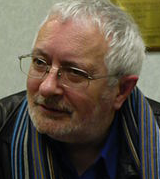 Like John Updike, Terry Eagleton is a productive writer. The Distinguished Professor of English Literature at Lancaster University has published more than 40 books, among them the popular college text Literary Theory: An Introduction.
Like John Updike, Terry Eagleton is a productive writer. The Distinguished Professor of English Literature at Lancaster University has published more than 40 books, among them the popular college text Literary Theory: An Introduction.
Many of his essays and books have been, in some way, contrary. He’s notoriously not a fan of postmodernism, for example, and if one were to judge from a single post uploaded by Jay Rothermel on the Marxist update blog, “Updike and Faulkner: How to Read Fiction by Terry Eagleton,” he’s not much of an Updike fan either.
After citing a passage from the Pulitzer Prize-winning Rabbit at Rest, Eagleton pronounces the writing “a highly accomplished piece of writing. Too accomplished, one might feel. It is too clever and calculated by half. Every word seems to have been meticulously chosen, polished, slotted neatly together with the other words and then smoothed over to give a glossy finish. There is not a hair out of place. The sentence is too voulu, too carefully arranged and displayed. It is trying too hard. There is nothing spontaneous about it. It has the air of being over-crafted, as every word is put fastidiously to work, with no loose ends or irregularities. As a result, the piece is artful but lifeless.”
I won’t take Prof. Eagleton to task for that rambling and redundant unpolished paragraph, for if I did, it would betray a bias against spontaneous and unpolished writing, as opposed to Eagleton’s bias against the polished.
As for methodology, Eagleton contrasts Updike’s paragraphs with those of Evelyn Waugh’s, comparing apples and oranges in various ways (poet-writer vs. writer alone, American vs. British, etc.) and praising Waugh’s “honesty and hard-edged realism about it which show up well in contrast to Updike.” Faulkner receives similar praise.
But the issue of bias or personal taste is especially clear if Eagleton’s “analysis” of Updike is considered. He asks readers to consider “this portrait of a female character”:
“Pru has broadened without growing heavy in that suety Pennsylvania way. As if invisible pry bars have slightly spread her bones and new calcium been wedged in and the flesh gently stretched to fit, she now presents more front. Her face, once narrow like Judy’s, at moments looks like a flattened mask. Always tall, she has in the years of becoming a hardened wife and matron allowed her long straight hair to be cut and teased out into bushy wings a little like the hairdo of the Sphinx.”
If any portion of that quote would be considered an example of “trying too hard,” you’d expect it to be the Sphinx reference. Yet, Eagleton says that’s “a pleasing imaginative touch.” He calls the phrase I liked best—”in that suety Pennsylvania way”—one that’s “rather too knowing, and the image of the pry bars is striking but too contrived.”
So is prose when someone has an axe to grind.
James Plath

They seek the same: “No, I don’t agree. I don’t use teletype paper, but there isn’t an awful lot of revision when I’m writing–things either grind to a halt or they keep on moving. I think he was right, Kerouac was right in emphasizing a certain flow, a certain ease. Wasn’t he saying, after all, what the surrealists said? That if you do it very fast without thinking, something will get in that wouldn’t ordinarily. I think one tends to spoil not only the thing at hand, but the whole art form, by taking too much thought, by trying to assert too much control.” (Picked-Up Pieces)